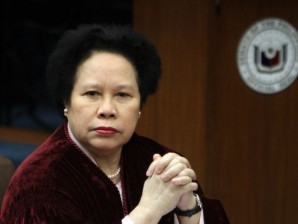MANILA, Philippines – Senator Miriam Defensor-Santiago blamed politicians, who are eyeing the 2013 senatorial elections, as one of the “biggest” sources of delays and confusions in the ongoing impeachment trial of Chief Justice Renato Corona.
Based on her own estimate, Santiago said the Corona trial would last for about five months –from Jan. 16, 2012 to end of May this year.
“Every senatoriable is eager to spout pious nonsense about impeachment, just to get free media advertising ahead of the campaign. In pragmatic terms, the vote of every senator running for reelection will depend on how much weight he or she will give to two opposing factors,” Santiago said in her speech during a joint annual convention of the Philippine Society of Hypertension, and Philippine Lipid and Atherosclerosis Society in Quezon City on Wednesday.Another factor, Santiago said, was the desire to run in the administration ticket, which she said was always conceded to be superior in terms of money and other resources.
|“The controverting factor is the desire to win the mass votes of certain NGOs with strong feelings in favor of the person impeached. It all boils down to conscience, if it exists,” she said.
Santiago noted how members of the House of Representatives who assumed the role of prosecutors seemed to do everything in front of the cameras.
“A problem with the representatives as prosecutors is that they want to do everything themselves in front of the cameras. This is the siren call of media, because it includes a certain amount of egotism and narcissism,” she said.
Unlike the prosecutors, Santiago said the senators, who sit as judges in the Corona trial, were not allowed to debate many issues in the trial in an open court.
“When debate is permitted among senators, it must be made in closed session. As a result, the reasons for certain decision in an impeachment trial may not be reflected in the public record,” she said.
And because the impeachment process is not only quasi-judicial but also quasi-political, Santiago said many senators also find themselves “either definitely friendly or definitely inimical to the Chief Justice.”
“In an ordinary judicial trial, persons with such attitudes would be disqualified. But if so, many of the senators would then have to be disqualified, and only a small remnant will remain to conduct the trial,” she said.
In a handbook written by Professor Charles Black, Jr. of Yale University, the senator pointed out a phrase which states that “The remedy has to be in the conscience of each senator.”
“Therefore, the ultimate issue is whether each senator has a conscience, and if that conscience is educated,” Santiago said.
But Santiago, still using Black’s handbook, explained that an impeachment proceeding should not necessarily result to a removal from office of the person being impeached.
She said that removal from office and disqualification to hold public office would be the worst penalty that the Senate could impose against an impeachable person but it could still impose lower penalties.
An acquittal of Corona in the ongoing impeachment trial, however, should never be taken as an “endorsement” or an “approval” of his conduct.
“Acquittal establishes only that the senators who voted no were not convinced of the guilt of the Chief Justice on the actual Articles of Impeachment, brought in by the House of Representatives,” Santiago added.
